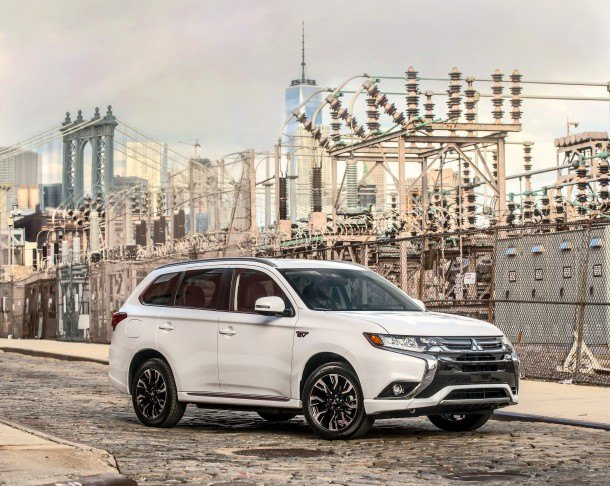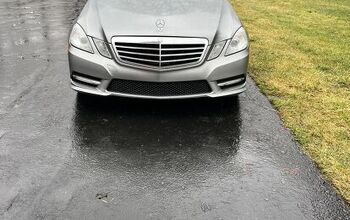2017 Mitsubishi Outlander PHEV Again Postponed, Won't Arrive Until Next Summer
The long-anticipated Mitsubishi Outlander plug-in hybrid, expected later this year, has once again been postponed for the U.S. and Canada.
This is at least the fifth time it’s been delayed in North America since its 2013 Japan-market launch. Mitsubishi’s U.S. market public relations manager, Alex Fedorak, confirmed the latest delay.
“Following a thorough evaluation process, we have determined that, in order to meet a level of competitiveness that will exceed customer expectations in the United States, the launch of the Outlander PHEV will be delayed until the summer of 2017,” said Fedorak.
Mitsubishi Canada’s public relations manager, John R. Arnone, also confirmed the delay. He said generally Mitsubishi Motors of Canada does get vehicles around the same time as Mitsubishi Motors North America, but declined to state a timeframe.
The all-wheel-drive SUV has been the best-selling PHEV in Europe, and would have filled a price-for-performance niche in the U.S. and Canada.
A Japan-market fuel economy cheating scandal have plagued Mitsubishi since earlier this year, which plummeted its first-quarter operating profits 75 percent.
The automaker is already in a weakened market position in the U.S., while in Europe, the Outlander PHEV’s sales slipped to third place during the first half of 2016.
In Japan, the scandal has decimated Outlander PHEV sales from a consistent level of around 1,000 units per month to one-quarter that over the past three months. After reporting 955 Outlander PHEV sales in March, Mitsubishi Japan reported 250 sales in April, 174 in May, and 253 in June.
At present, Mitsubishi is in the process of allying with Nissan. This tie-up is expected to finalize in October and will begin a new chapter for the beleaguered automaker, which still has plans for more electrification.
The Outlander PHEV was fully revised for 2016 and its 12-kWh battery promised enough usable range, combined with all-wheel-drive SUV performance, to fill a niche no other automaker has yet to serve at the same price point.
The crossover is sold in at least 48 global markets, but Mitsubishi has bypassed North America despite consumer demand and as upscale Porsche Cayenne, BMW X5, and Volvo XC90 plug-in SUV variants have come to market.
In all, just 13 plug-in hybrids — mostly front-wheel-drive cars — are now on sale in the U.S.
Arnone said when the Outlander PHEV does arrive, it will be the best vehicle it can be in this segment, and indeed its standing as one of the world’s best-selling plug-in electrified vehicles lends credence to that statement.
[Image: Mitsubishi]
This article originally appeared on Hybrid Cars.
More by Jeff Cobb
Latest Car Reviews
Read moreLatest Product Reviews
Read moreRecent Comments
- Analoggrotto I don't see a red car here, how blazing stupid are you people?
- Redapple2 Love the wheels
- Redapple2 Good luck to them. They used to make great cars. 510. 240Z, Sentra SE-R. Maxima. Frontier.
- Joe65688619 Under Ghosn they went through the same short-term bottom-line thinking that GM did in the 80s/90s, and they have not recovered say, to their heyday in the 50s and 60s in terms of market share and innovation. Poor design decisions (a CVT in their front-wheel drive "4-Door Sports Car", model overlap in a poorly performing segment (they never needed the Altima AND the Maxima...what they needed was one vehicle with different drivetrain, including hybrid, to compete with the Accord/Camry, and decontenting their vehicles: My 2012 QX56 (I know, not a Nissan, but the same holds for the Armada) had power rear windows in the cargo area that could vent, a glass hatch on the back door that could be opened separate from the whole liftgate (in such a tall vehicle, kinda essential if you have it in a garage and want to load the trunk without having to open the garage door to make room for the lift gate), a nice driver's side folding armrest, and a few other quality-of-life details absent from my 2018 QX80. In a competitive market this attention to detai is can be the differentiator that sell cars. Now they are caught in the middle of the market, competing more with Hyundai and Kia and selling discounted vehicles near the same price points, but losing money on them. They invested also invested a lot in niche platforms. The Leaf was one of the first full EVs, but never really evolved. They misjudged the market - luxury EVs are selling, small budget models not so much. Variable compression engines offering little in terms of real-world power or tech, let a lot of complexity that is leading to higher failure rates. Aside from the Z and GT-R (low volume models), not much forced induction (whether your a fan or not, look at what Honda did with the CR-V and Acura RDX - same chassis, slap a turbo on it, make it nicer inside, and now you can sell it as a semi-premium brand with higher markup). That said, I do believe they retain the technical and engineering capability to do far better. About time management realized they need to make smarter investments and understand their markets better.
- Kwik_Shift_Pro4X Off-road fluff on vehicles that should not be off road needs to die.


































Comments
Join the conversation
I would say Tesla 3. I would go to Mitsu dealership only if I had concealed weapos with me. Last few times I have been in Mitsu dealership it felt like visiting drug dealer (as shown in movies). And sales "specialists" were hiding somewhere and ones who eventually showed up alive did not look credible enough to do business with.
It's what BTSR kept telling Chevy it should make: a bigger Volt. Sort of. Top Gear and a few others have reviewed the Mitsu. Compared to the current Volt, the Mitsu's gas engine is loud and coarse, its ride is trucklike, and its electric range is considerably shorter. But its passive safety ratings are good and its active safety options are comparable to the Volt's, and its price should be competitive. The pitch is appealing: get to work without using any gas, get 40 mpg on road trips, and have enough room to bring Sage and Moxie along on your Costco runs...and don't spend Volvo XC90 PHEV or BMW X5 PHEV money for the privilege. I don't think it'll sell as well in the US as it does in Europe, where tradition and tax law mean your company is paying the steepish purchase price of the car itself, and your personal cost consists of high-priced gasoline and tax liability based on the car's environmental impact. There, people look at this car and see thousands of extra pounds or euros in their wallet each year. Here, we'll likely look at it and say "so I can have the refinement of a truck and the price and specs of a first-year Volt? Meh." But we'll see. It will be in a class of one.